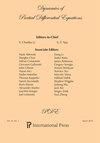关于吸引子分岔的评述
IF 1.1
3区 数学
Q2 MATHEMATICS, APPLIED
引用次数: 6
摘要
本文给出了一类非线性演化方程的不变量集的局部动态分岔结果。我们证明了如果平凡解是系统在临界值$\lambda=\lambda_0$处的孤立不变集,那么要么存在$\lambda_0$的单侧邻域$I^-$,使得对于每一个$\lambda\ I^-$,系统从平凡解分叉到一个孤立的非空紧不变集$K_\lambda$,其中$0\not\在K_\lambda$中;或者存在$\lambda_0$的单侧邻域$I^+$,使得系统从$(0,\lambda_0)$中$\lambda\在$I^+$中发生吸引子分岔。然后给出了吸引子分岔定理的一个修正版本。最后,我们考虑经典的Swift-Hohenberg方程,并说明如何将我们的结果应用于具体的演化方程。本文章由计算机程序翻译,如有差异,请以英文原文为准。
A remark on attractor bifurcation
In this paper we present some local dynamic bifurcation results in terms of invariant sets of nonlinear evolution equations. We show that if the trivial solution is an isolated invariant set of the system at the critical value $\lambda=\lambda_0$, then either there exists a one-sided neighborhood $I^-$ of $\lambda_0$ such that for each $\lambda\in I^-$, the system bifurcates from the trivial solution to an isolated nonempty compact invariant set $K_\lambda$ with $0\not\in K_\lambda$, or there is a one-sided neighborhood $I^+$ of $\lambda_0$ such that the system undergoes an attractor bifurcation for $\lambda\in I^+$ from $(0,\lambda_0)$. Then we give a modified version of the attractor bifurcation theorem. Finally, we consider the classical Swift-Hohenberg equation and illustrate how to apply our results to a concrete evolution equation.
求助全文
通过发布文献求助,成功后即可免费获取论文全文。
去求助
来源期刊
CiteScore
2.00
自引率
0.00%
发文量
7
审稿时长
>12 weeks
期刊介绍:
Publishes novel results in the areas of partial differential equations and dynamical systems in general, with priority given to dynamical system theory or dynamical aspects of partial differential equations.

 求助内容:
求助内容: 应助结果提醒方式:
应助结果提醒方式:


